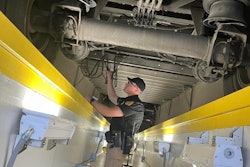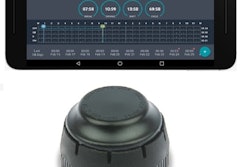The Federal Motor Carrier Safety Administration’s Drug and Alcohol Clearinghouse has been in place for almost 5 years now, with nearly 300,000 drug and alcohol violations reported to it since it took effect at the beginning of 2020.
While drivers reported to the Clearinghouse with a violation have been put in “Prohibited” status where they shouldn’t be allowed to drive, Phase 2 of the Clearinghouse rule will take effect this coming Monday, November 18, to take that a step further.
Joining Jason and Matt this week on the 10-44 is Brandon Wiseman, president of Trucksafe Consulting, who talks about the changes and how it could affect the industry.
Contents of this video
00:00 10-44 intro
00:28 FMCSA’s Drug and Alcohol Clearinghouse
03:22 Carriers and annual Clearinghouse queries
06:00 Keeping prohibited drivers off the road
07:53 Return-to-Duty process
09:07 Tips to stay compliant
10:47 Changes to driver’s status
Jason Cannon:
CCJ's 10-44 is brought to you by Chevron Dello, heavy duty diesel engine oil. Now there's even more reasons to choose Delo,
Matt Cole:
How phase two of FMCSA Drug and Alcohol Clearinghouse could affect trucking.
Jason Cannon:
You're watching CCJ's 10-44, a weekly episode that brings you the latest trucking industry news and updates from the editors of CCJ. Don't forget to subscribe and hit the bell for notifications, so you'll never miss an installment of 10 44. Hey everybody, welcome back. I'm Jason Cannon and my co-host is Matt Cole. The Federal Motor Carrier Safety Administration's Drug and Alcohol Clearing House has been in place for about five years now with nearly 300,000 drug and alcohol violations reported to it since it took effect at the beginning of 2020.
Matt Cole:
While drivers reported to the clearinghouse with a violation have been put in prohibited status where they shouldn't be allowed to drive. Phase two of the clearinghouse rule will take effect this coming Monday, November 18th to take that a step further.
Brandon Wiseman:
So November 18th, 2024, uh, will be the implementation of what they're calling Clearing House phase two. And, uh, this is, this has kind of been the plan all along, but it's, it's been rolled out in phases. So we saw clearing House phase one implemented in January of 2020, right middle of the pandemic. That's when they stood up the infrastructure for the clearinghouse where, uh, all of the drug and alcohol testing violation data gets reported to now, and where employers of CDL drivers now have to do the queries through the clearinghouse when they're hiring a new driver and then annually on all of their existing CDL drivers to see if any of those drivers have a disqualifying drug or alcohol violation that would re render them disqualified from operating a commercial motor vehicle. The problem we've had, you know, that's been a great system so far, it's caught a bunch of, uh, drivers.
I think the last numbers I saw, there are nearly 180,000 CDL drivers currently in prohibited status in the clearinghouse due to a drug or alcohol testing violation. And so that has been the system up until this point, but effective November 18th, uh, of this year will be the next phase, which is to take it the next step and say not only will you CDL driver be put into prohibited status in the clearinghouse if you violate the drug or alcohol testing regulations, but we're also going to require your state licensing agency to, to strip you of your CDL because of that. And it makes sense to do that because if you get a drug or alcohol testing violation as a CDL driver, you're prohibited from operating a commercial motor vehicle. So your CDL is doing you no good anyway. So, but the problem was the states haven't until this point been mandated to take that step and actually downgrade the CDL.
And so what we have now is any driver who's licensed in, in one of the states that hasn't been voluntarily doing this to this point, they've continued to hold a valid CDL. It looks like they're good to go if you're just looking at their license and not their clearinghouse status, um, despite the fact that they are prohibited from operating commercial motor vehicle. So, long story short here, November 18th, state licensing agencies are going to be mandated to automatically downgrade the CDLs of drivers who are in prohibited status in the clearinghouse because of a drug and alcohol violation.
Jason Cannon:Up until now, it's been up to the motor carriers themselves to self-police through required annual clearinghouse queries to ensure that none of their drivers are in prohibited status.
Brandon Wiseman:
You know, that's a big assumption that carriers are doing what they're supposed to be doing. We, um, we encounter so many carriers even, you know, four years into the clearinghouse at this point that haven't even heard of the clearinghouse. It's like, what are you doing? I mean, that's a, you know, you've had four years to get your stuff together and to start using a clearinghouse as you're supposed to be doing. Now you've got four years of exposure for not using the clearinghouse. It's just crazy to me how many carriers still don't even know about it, let alone use it. And so, you know, that's, that's the other problem is that carriers haven't been using it like they're supposed to be using it. Certainly a lot of carriers do use it, but not all of them. And so now this will be a, an additional check on the system because they're also supposed to be running motor vehicle reports on all of their drivers at least annually.
And now if those drivers are also losing their CDLs because of these drug and alcohol testing violations, even the carriers that haven't been using the clearinghouse should see that problem. Now as they're running their mvs, assuming they're, they're doing that part of it, it shouldn't have any impact on the pool of available drivers because that those drivers were not available. But the issue is those carriers that aren't paying attention to the Clearing House that are just ignoring it, they have been using these drivers because they have valid CDLs and so they think they're okay because they're not checking the Clearing Clearinghouse. And so to them, to the carriers that aren't doing what they're supposed to be doing and checking the clearinghouse, they're going to now see drivers coming to them that don't have valid CDLs. And so, um, if, if to those carriers that aren't doing the right thing, then it's gonna look like the capacity of CDL drivers has dipped by 180,000 drivers potentially. So that, that's the issue
Matt Cole:
Because mvs are often required by insurance companies or insurers are running them on behalf of motor carriers. Clearinghouse phase two should keep more prohibited drivers off the road. We'll hear more on that from Brandon after a word from 10 44 sponsor Chevron lubricants.
Speaker 4:
We serve customers from Birmingham, Alabama to the Gulf Coast. So our people and our trucks are booked solid all day. There is no slack in our schedules. These trucks can't break down. I choose an engine oil that takes care of the number one issue with our engines emissions. So we don't have to worry about DPF clogging. I choose the engine oil that keeps our trucks hauling. I choose DELO 600 A DF.
Brandon Wiseman:
A lot of times MVRs are driven by in your insurance as well. So a lot of, a lot of insurers for smaller carriers are either running the MVS on behalf of their insured customers or at least mandating that the carriers do that. And so, uh, I think, I think a lot more carriers are bought into running mvs than they are to the clearinghouse. And so hopefully now with Clearinghouse two and drivers losing their CDLs because of a drug and alcohol violation, we will see fewer drivers out on the road who shouldn't be there because they're in prohibited status in the clearinghouse. We're gonna see a lot of drivers lose their CDLs if they're domiciled in states that haven't been voluntarily there. Certainly there have been states in the country that have been doing this voluntarily, they have been checking the clearinghouse and, um, suspending the CDL or down, I should say downgrading the CDL, they're not gonna, you're not gonna lose your operator's license.
In other words, you're still gonna be able to drive a passenger car, but what you're gonna lose are your CDL credentials. So states have, some states have been doing that, but certainly not all of them. So again, we have this universe of nearly 180,000 CDL drivers that are in prohibited status in the clearing house. Many of those who are domiciled in the states that haven't been voluntarily doing this are now going to all of a sudden wake up on November 19th or whenever it it is, and now they're not gonna have a CDL anymore. And so, you know, if they're working for a carrier still who hasn't run a clearinghouse query and who hasn't already pulled them off the road, now they're gonna be without a CDL. So now it's gonna be even more obvious to anybody that's checking us their, their license that they shouldn't be out there operating. So if they get pulled over for roadside inspection, it's gonna be painfully obvious that they shouldn't be there driving. And, uh, if they're working for that carrier that's run at least running mvs, then that's gonna be a big problem for them. So we're gonna have that, that that's gonna be the, the major impact
Matt Cole:
As of FMCSA's September clearinghouse report of the 267,000 plus drivers to have a violation reported to the clearinghouse since it began only about 88,000 of those have completed the return to duty status to get put back on the road. Will clearinghouse phase two increase that number?
Brandon Wiseman:
You'll probably see a certain, a a percentage of those drivers who now lose their CDLs, who say, oh crap, I, I gotta do something. And the only something that you can do if you still want to be a truck driver is to go through the return to duty process. So I think we will see probably an uptick in drivers who, who start the return to duty process. But I, you know, cynical me, uh, I don't think it's gonna be a significant uptick. Uh, like you said, there is only a small percentage of existing drivers who have been put into prohibited status who have even started the return to duty process, meaning they're either out there working for a carrier that doesn't care about the clearing house and who hasn't run it, or they have just left the market altogether and they're doing something else. And so, yeah, cynical me says that I, I suspect that a lot of these drivers, assuming it will be harder for them to now get a CDL driving job, they'll probably just leave the market if I had to guess.
Jason Cannon:
While the motor carrier clearing house requirements don't change with its second phase taking effect, Brandon has some suggestions for fleets to ensure they remain compliant.
Brandon Wiseman:
Clearinghouse two doesn't have any carrier requirements tied to it, so there's nothing specifically that a carrier has to do effective November 18th. Um, but there are some, uh, what we're recommending to our clients is that you need to prepare for it if you're not already prepared for it. So number one, if you're a carrier that's not using the clearinghouse, you need to be using the clearinghouse. Go in there, do the, do the queries on all of your current CDL drivers and see which ones are in prohibited status, and then pull them from the road if they are in prohibited status, you should have been doing that all along, but now's a good reminder to go ahead and do that because effective November 18th, they're also gonna lose their CDL. So now you're not only gonna have drivers out on the road that are in prohibited status, now you're gonna have drivers out on the road that don't have the right type of license to operate the truck that they need to, that you want them to operate.
So carriers run your limited queries through the clearing house, make sure you're up to date on all of those. And after November 18th, you know, November 19th, 20th, you know, shortly thereafter, you may also want to consider running new motor vehicle reports on your existing universe of CDL drivers to make sure that none of your universe of drivers have lost their CDL because of this rule. And if any of them have lost their CDL because of this, then you need to, number one, pull them from the road because they're, they can't operate anymore. And number two, figure out why you didn't catch that beforehand with a clearinghouse query and, uh, and start to fill those gaps. So that's my advice to carriers
Matt Cole:
With updates to the clearinghouse in the last year or so. Brandon says carriers shouldn't need to run a clearinghouse query on their drivers more than the required annual report.
Brandon Wiseman:
In the past, I would've said yes, but the clearinghouse was actually updated. It was either earlier this year or late last year to change the way that the system notifies motor carriers of changes to a, an existing driver's clearinghouse status that I think does away with the need for carriers to do these more than annually. So right now, the system is structured such that if I run a limited annual query on driver John Doe today, if he later, let's say he goes and applies to a different motor carrier and he tests positive on a pre-employment test for another motor carrier, this, and, and that gets reported to the clearinghouse, the system will automatically notify me if his status changes too prohibited because of that other test, and it will do that for a full 12 months after I ran that first query. So the system does a good job now of automatically notifying carriers if the status of their driver changes within the 12 months after they ran a query. And for that reason, I don't think it's necessary for them to run any more queries other than what's, which is once a year.
Jason Cannon:
That's it for this week's 10 44. You can read more on ccj digital.com. While you're there, sign up for our newsletter and stay up to date on the latest in trucking industry news and trends. If you have any questions or feedback, please let us know in the comments below. Don't forget to subscribe and hit the bell for notifications so you can catch us again next week.










